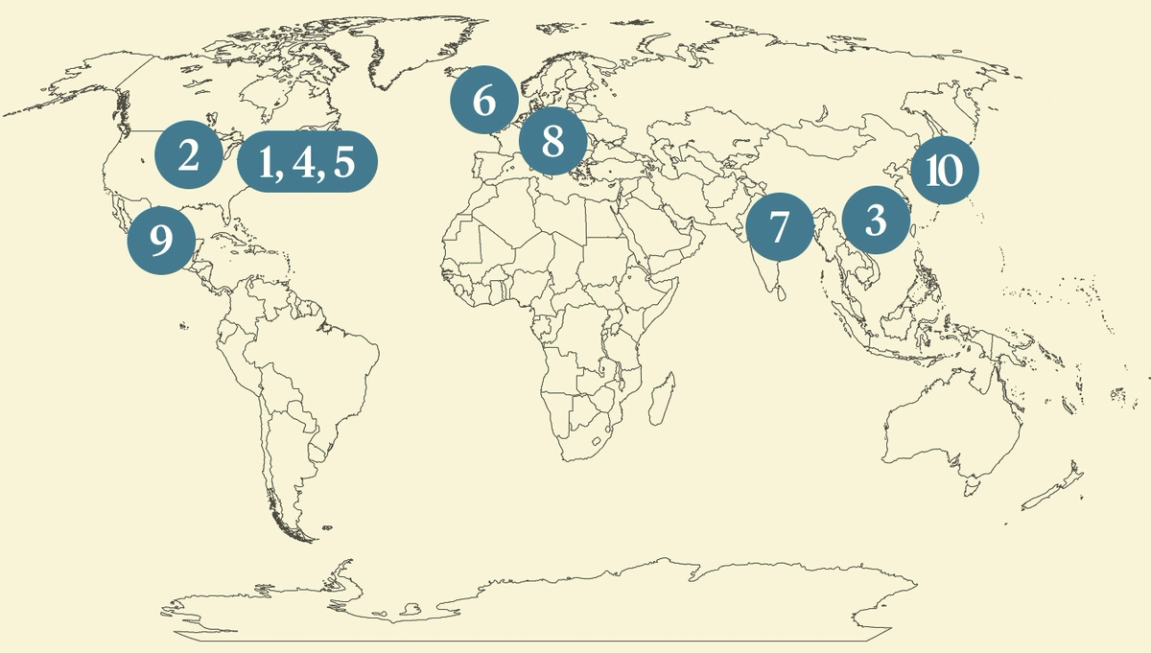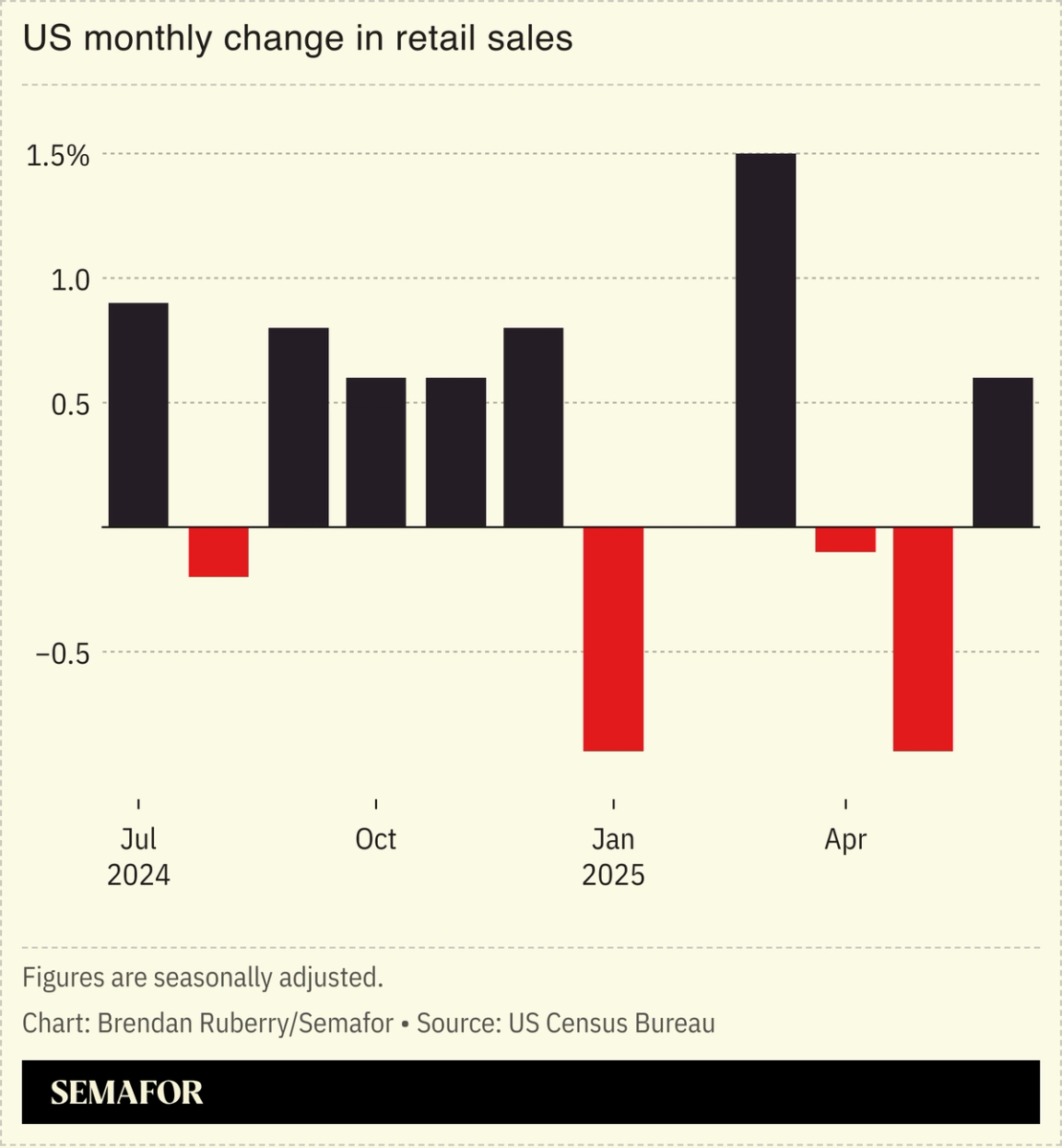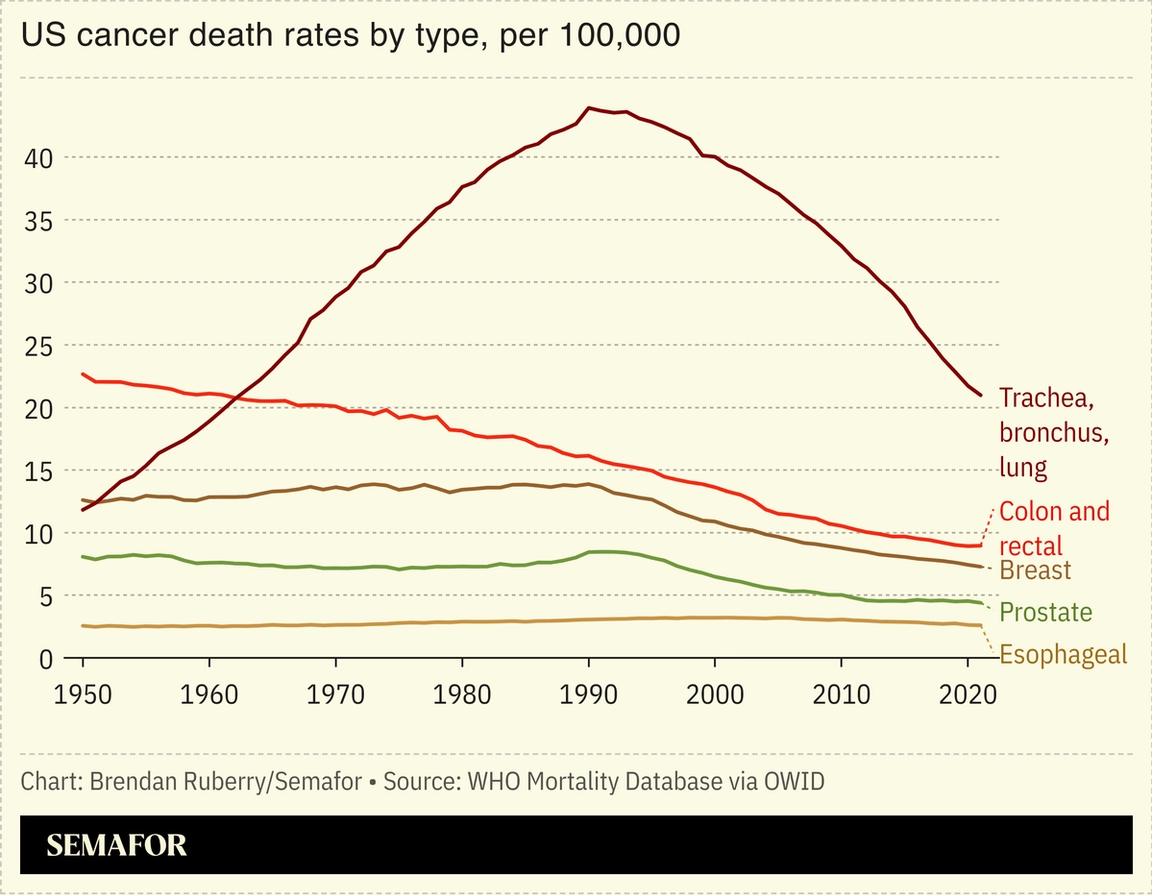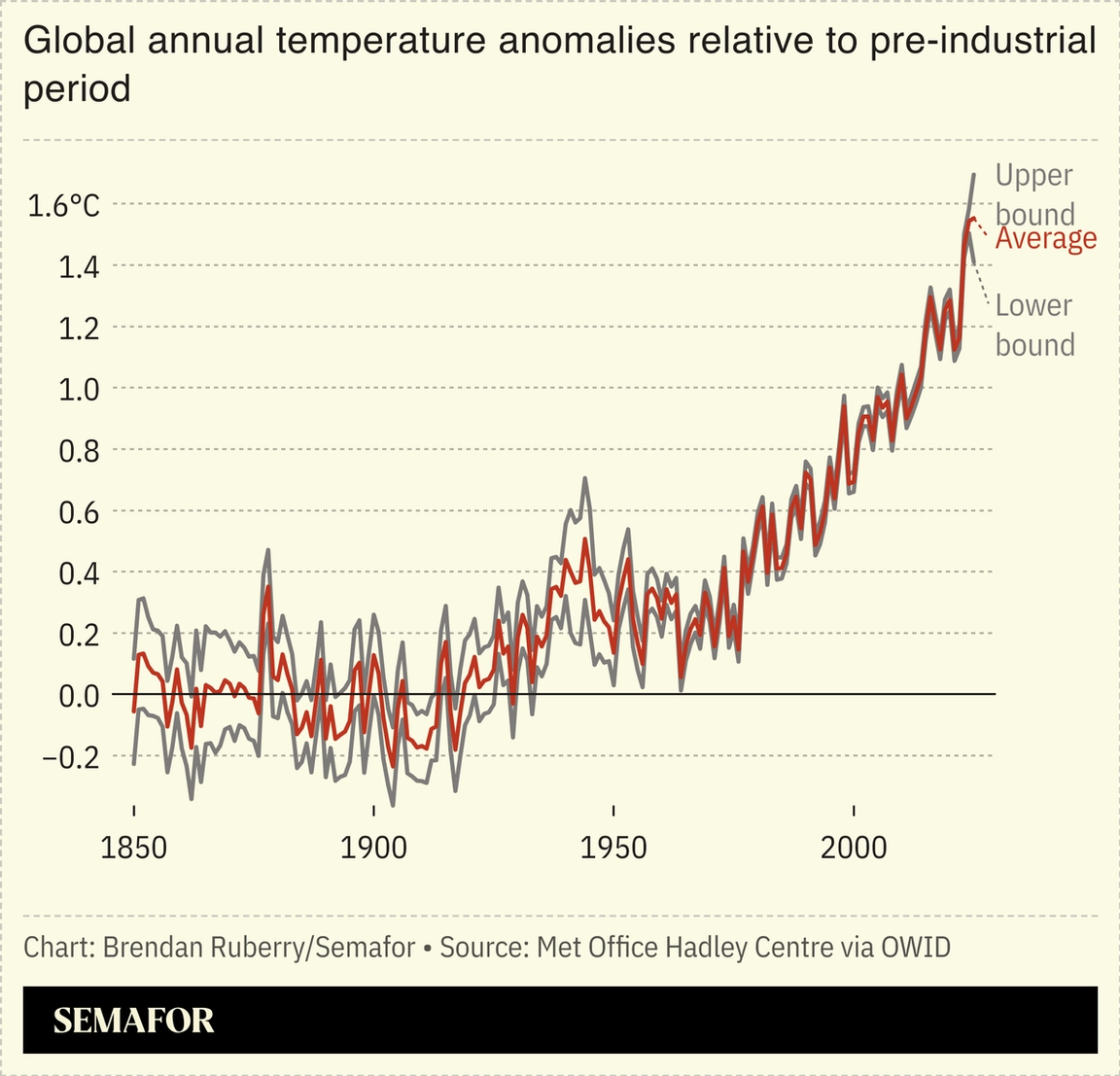| | Investors are spooked by Donald Trump’s threats to fire the Fed chair, the world is winning the “war͏ ͏ ͏ ͏ ͏ ͏ |
| |  | Flagship |  |
| |
|
The World Today |  - Fed independence wariness
- US retail sales rebound
- China’s big BRI push
- Shareholders back DEI
- Consulting faces a crash
- UK lets 16-year-olds vote
- Winning the war on cancer
- Less pollution, more warming
- Mexico City overtourism
- Godzilla’s global expansion
 Nature’s miniature marvels go under the magnifying glass in DC, and our latest Substack Rojak. |
|
Investors on edge over Powell firing threat |
 Kevin Lamarque/Reuters Kevin Lamarque/ReutersGlobal investors and economists remain on edge over US President Donald Trump’s flirtation with firing Federal Reserve Chair Jerome Powell, despite markets making a quick comeback. Stocks and the dollar stabilized after Trump denied plans to fire Powell over the central bank’s hesitancy to cut interest rates. “The immediate crisis may have passed, though we doubt we are entirely done with this saga,” JPMorgan’s chief US economist said. The perception of a possible incursion into the Fed’s independence has spooked countries and companies abroad — as well as Wall Street CEOs — given that economic turmoil in the US could upend the global economy, The New York Times wrote. |
|
 The S&P 500 and Nasdaq closed at record highs Thursday after June’s jump in US retail sales beat economists’ forecasts and showed Americans are opening their wallets despite worsening sentiment. Analysts cautioned, though, that the sales figures aren’t adjusted for inflation, and some of the rebound may reflect rising prices rather than increased consumer demand. June’s inflation report showed notable price increases in tariff-exposed categories like furnishings, appliances, toys, and sporting goods. Still, Thursday’s numbers offer a moment of relief amid swelling concern over consumer health: Sales at restaurants and bars — often seen as a barometer for discretionary spending, and usually the first to fall when wallets tighten — also rose in June. |
|
China BRI investment hits record |
 Emmanuel Herman/Reuters Emmanuel Herman/ReutersChina’s flagship global infrastructure effort has seen a record level of investment and construction contracts this year. The Belt and Road Initiative has funded highways, railroads, and energy projects around the world: In the first half of 2025, 176 deals totaling $124 billion already surpassed the $122 billion in projects for all of last year. One analyst attributed the push to lagging domestic growth in China and Beijing’s need to diversify supply chains due to the US-led trade war, while other countries are likely embracing “an opportunity to deepen ties with China amid shifting global geoeconomic dynamics.” The BRI has allowed Beijing to expand its economic influence as Washington scales back its international presence. |
|
 Jose Luis Magana/Reuters Jose Luis Magana/ReutersShareholders of large US companies overwhelmingly backed diversity, equity, and inclusion programs this year, despite Washington’s staunch resistance to such initiatives. An analysis found that across 24 companies, including Amazon, Disney, and Apple, anti-DEI shareholder resolutions were defeated by a margin of 98% to 99%, according to S&P Global. “They’re saying in Washington that no one likes DEI, well, 99% of shareholders actually do,” the head of an investor advocacy group said. The White House has targeted initiatives across universities and boardrooms: T-Mobile dropped its DEI programs to secure federal approval on two deals last week. Some companies are simply rebranding inclusion efforts, or focusing on “safer” subjects like mental health, The New York Times reported. |
|
AI threatens corporate consulting |
 IMAGO via Reuters IMAGO via ReutersThe corporate consulting industry is facing a crash, as artificial intelligence eats its lunch and the US government withdraws its contracts, a leading business journalist argued. McKinsey, Bain, Deloitte, and other consulting giants became huge during the acquisitions boom of the 1980s, Joe Nocera wrote in The Free Press, helping merged firms become efficient. Their utility has diminished but they remain profitable, Nocera noted. But AI can now do similar analysis in-house at a fraction of the cost, and the White House wants to cut most of the $65 billion in contracts it has with the top 10 consulting firms. The billionaire Peter Thiel told Nocera that “if the consulting business was a stock, I’d be shorting it right now.” |
|
UK allows 16-year-olds to vote |
 Hollie Adams/Reuters Hollie Adams/ReutersThe UK lowered the voting age to 16 before the next general election. The ruling Labour Party — which, coincidentally, performs better among young people — announced the move as part of a major shakeup of the electoral system. Changes to the franchise are often introduced by the party that stands to gain from it, but the impacts can be unpredictable: The Whigs expanded voting to the British middle classes in 1832, but the Conservatives picked up most of their votes; in 1913, the US Democrats pushed through the 17th Amendment allowing direct election of senators, which boosted populist politics that often worked against them; and the Liberals’ introduction of women’s suffrage in Britain in 1918 accelerated the party’s ongoing decline. |
|
Cancer death rates are falling |
 More than 50 years after then-US President Richard Nixon declared a “war on cancer,” the world is largely winning that battle. The age-adjusted cancer death rate has fallen since the 1990s, signaling a “steady but successful war of attrition,” The Economist wrote. Progress has come through thousands of small advances in screening and treatment: Childhood leukemia had a five-year survival rate of about 60% in 1975; now it’s about 90% in the US. Successes in prevention, largely overlooked, have been especially critical. Declining smoking rates have prevented millions of lung cancer deaths, experts say. Cheaper and more widely available medication will be central to future progress: India is undertaking a mass HPV vaccination campaign that is forecast to reduce cervical cancer rates. |
|
Less pollution behind increased warming |
 Two-thirds of the planet’s warming since 2001 is due to reduced air pollution, rather than increased carbon concentrations, a new study suggested. Sulfur dioxide pollution in the atmosphere can increase cloud density, making them whiter. That reflects the sun’s energy back into space, reducing warming. SO₂ emissions, especially from industry and shipping, have reduced in recent decades. The new modeling suggests that this reduction has had a considerable impact on warming. It’s encouraging, argued New Scientist, because it implies the rapid warming over the last few years will be short-lived, whereas if it was due to carbon, it would imply that the atmosphere is more sensitive to emissions than thought and would also mean we could expect it to continue. |
|
Mexico City vows to fight displacement |
 Mariana Hernandez/Reuters Mariana Hernandez/ReutersMexico City this week announced a plan to combat gentrification after fierce protests drew attention to the rising cost of living in the capital. Demonstrators earlier this month shattered storefronts and sprayed graffiti saying “get out of Mexico,” aiming their ire at mass tourism and the rising trend of “digital nomads” who move to the city to work remotely. Officials vowed to build more housing and take steps to cap rent increases to limit displacement, El País reported. The protests echoed similar concerns in other global hotspots like Barcelona, Genoa, and Lisbon, “where tourist apartments have proliferated, turning long-term residents into a rarity,” The Guardian wrote. |
|
Godzilla company eyes global expansion |
 Kyodo News via Reuters Kyodo News via ReutersThe Japanese company behind Godzilla is eyeing global domination. Toho is Japan’s largest domestic filmmaker and theater owner, but doesn’t have international recognition. With growing worldwide interest in anime and legacy IP assets, the company is putting about $1 billion over the next three years toward acquisitions, new international content based on its existing properties, and other avenues like amusement rides and theater, Bloomberg reported. In 2014, Toho licensed the English-language rights to Godzilla, so it didn’t get much revenue from Hollywood movies featuring the monster. But Toho’s success with the Japanese-language Godzilla Minus One in 2023 underpinned its current strategy of exporting more content it fully owns. |
|
 July 18: |
|
|